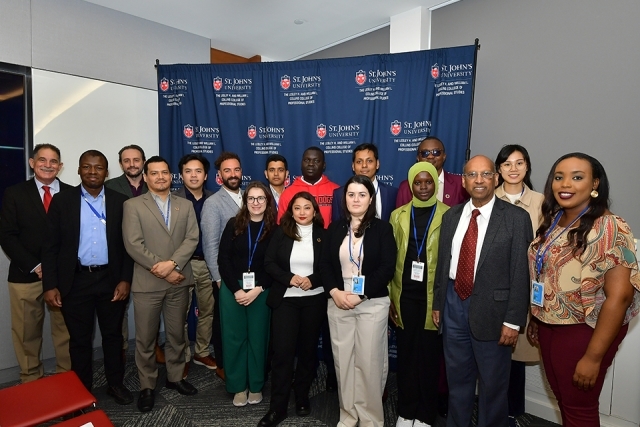
United in their appreciation of the power of global media, St. John’s University journalism students and faculty engaged in an enthusiastic discussion with members of the United Nations 2023 Reham al-Farra Memorial Journalism Fellowship at a roundtable conference on September 27.
Led by Michael A. Rizzo, Associate Professor and Director of the Journalism program at The Lesley H. and William L. Collins College of Professional Studies, the conference introduced students to 10 journalists from the developing world who now cover the United Nations. It was the first time the journalism fellows, who hail from a combined four continents, had visited an American college campus as a group.
The cohort impressed upon the 30-plus St. John’s students the need for continued commitment to journalism at a time when global press freedoms are in jeopardy.
“I genuinely believe that as a journalist I am serving my country,” said Mara Cepeda, Philippines correspondent for The Straits Times, a leading newspaper and online news source based in Singapore. “I do this because I want my country to be the best it can be.”
“I have heard it said that journalism is dying in the United States,” added Wani Isaac Kenyi, an investigative reporter for The Insider South Sudan. “In South Sudan, we say it is like Lazarus. It has been dead a long time and now we hope for a resurrection.”
Professor Rizzo, whose classes include The Press and Government, News Reporting and Writing, Sports Broadcasting, and more, brought the UN fellows to St. John’s to illustrate to his students how modern journalists do their jobs.
Equally important, however, was why they do them. Despite lacking the press freedoms American journalists enjoy, the panelists said they see themselves as guardians against the totalitarian tendencies of their governments.
“Journalism in South America is an uncomfortable activity,” said Mauro Calvagna, a multimedia journalist from Buenos Aires, Argentina. “You are the representatives of the silent voices of the population—those who others don’t want to hear from.”
The UN fellowships offer the journalists, who range in age from 22 to 35, an opportunity to report on events at the United Nations for several weeks each fall, coinciding with the opening of the UN General Assembly. The fellowships are named in honor of Reham Al-Farra, a 29-year-old Jordanian public information officer who was killed in the 2003 bombing of the UN headquarters in Baghdad, Iraq.
The University was delighted to welcome the fellows.
“Journalism has an essential role in sustaining democracy,” said Luca Iandoli, Ph.D., Dean and Professor, The Lesley H. and William L. Collins College of Professional Studies. “But our political debate has become so highly polarized, and this element of our democracy—journalism—is under attack. When news can be delivered at the speed of light and at no cost, how will we protect ourselves from the bad actors?”
Once their time at the UN is complete, the journalists are expected to continue working in their home countries, ideally elevating the quality of journalism there while promoting a better understanding of the UN’s mission.
For some of the journalists, that is easier said than done. Mr. Kenyi, a former refugee of South Sudan’s war of independence from Sudan, reports from one of the least developed countries in the world, where tempers are short and adversaries have long memories.
Twelve years after gaining independence, South Sudan is still attempting to develop an economy. The government has put off elections repeatedly since 2015 and kept journalists under close watch.
“In 2011, we were witnessing the joy and celebration of independence,” Mr. Kenyi said. “Three years later, we were back in a brutal civil conflict. Our gains were short-lived.”
The journalists offered some words of wisdom for the St. John’s students. Among them: When writing the first draft of history, never forget the lessons of the past. Also, do not shy away from a story that appears difficult to tell.
“Find the human angle,” advised Redwan Ahmed, a freelance journalist from Dhaka, Bangladesh. “See the tears of a mother or a child; approach a story that way.”
“Know your audience and explain things to them in a way that has context and history,” added Susana Roa, newsroom chief at the digital news source GK in Quito, Ecuador. “Tell them not just what it means now, but relate it to something that happened before or has happened in other countries.”
Related News
Q&A with School of Education Alumna Linda I. Rosa-Lugo, Ed.D. ’77ED, ’79M.S.Ed.
Linda I. Rosa-Lugo, Ed.D. ’77ED, ’79M.S.Ed., recently accepted a new role as President of the American Speech-Language-Hearing Association (ASHA). Prior to this, Dr. Rosa-Lugo has been an active...
TSOE Alumna Appointed Director of Curriculum in Amityville
Jessica Kemler ’99ED,’22Ed.D.—a double alumna of The School of Education at St. John’s University—began the new year as the new Director of Curriculum in the Amityville, NY, School District. “We are...
Alumna Celebrates Book Launch After Career Change
After developing a passion for helping the younger generation, Ashley Wilson ’14M.S.Ed. pivoted from a career in the music industry to work as an educator. She is also making her mark through her new...
